It’s weird! When I am online and I mention to people that I live in Saudi Arabia, they start to freak out. ‘You live where?’ they ask. ‘But, it’s so dangerous!.’
I find that reaction very puzzling. Perhaps, I’ve missed something. Actually, in all my years here, I have never felt especially that I or my family were in any danger.

However, it seems that the media has done a great job convincing people who live outside the kingdom that Saudi Arabia is very unsafe and that it is a country best to be avoided.
So How Safe Is Saudi Arabia For Tourists and Foreign Nationals?
On a scale of 0 to 100%, the truth about the safety of tourists and foreign nationals in KSA is that it is 90% + safe. So, in terms of crime and personal risks, the country is very safe indeed. However, in terms of driving on the highways, the work environment and exploring uncharted, remote areas, it isn’t so safe given the inherent risks involved in these activities.
Media Exaggeration

It’s not that what the media says is untrue. It is simply that they like to exaggerate the actual threats and risks that actually do exist. After all, such overstatements make for great news, help feed people’s prejudices and certain political agendas.
The goal of this article is to clearly identify what the threats, dangers, and risks really are for tourists and visitors to Saudi Arabia in the year 2020 and beyond.
If you are intending to come to Saudi Arabia for work, business, for the pilgrimage (Hajj and Umrah), as a tourist or to visit family and friends you really need to know what the truth is about safety.
Knowing this, you can prepare yourself in advance and get ready to face all possible eventualities.
Before we identify the dangers and safety issues, let us quickly see who the foreign nationals are and why they come to the Kingdom of Saudi Arabia.
So, Who Visits Saudi Arabia?
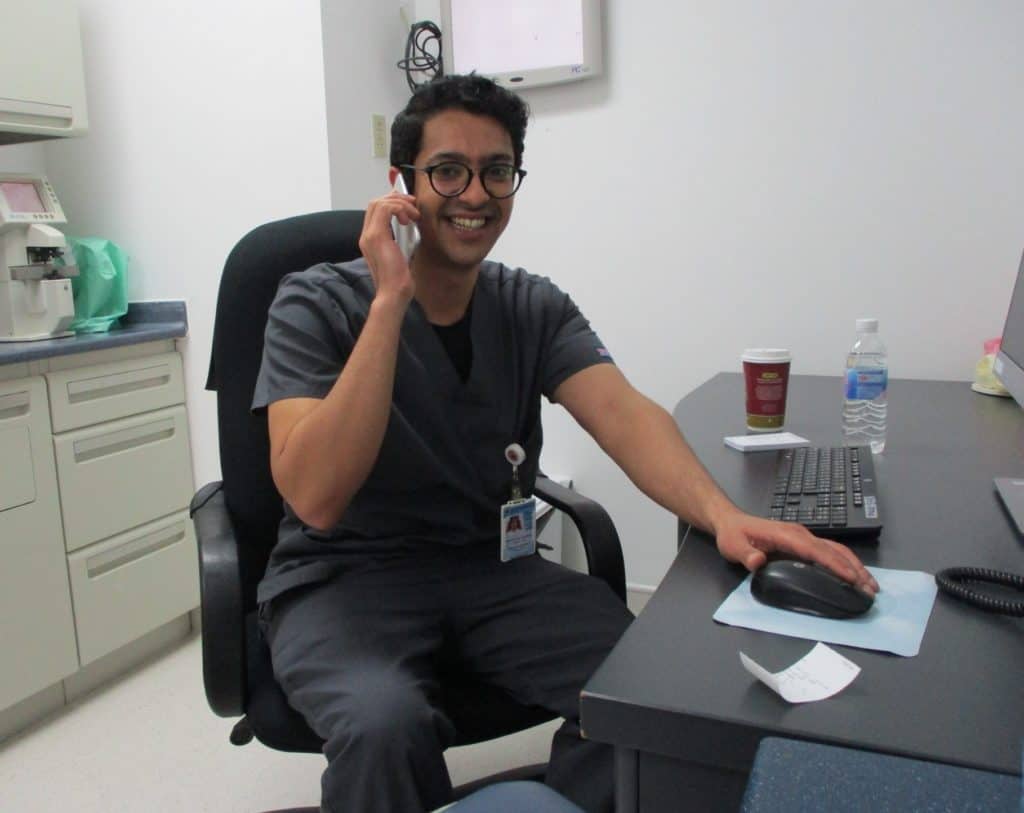
To foreign nationals, Saudi Arabia offers visas for:
- Work
- Business
- Pilgrimage (Hajj and/or Umrah)
- Family Visits
- Tourism (eVisa/Visa on Arrival)
- Diplomatic Purposes
- Saudi Premium Residency (Green Card)
- Transit
For Work
10,736,293 foreign expats live and work in the kingdom. They represent 33% of the total Saudi population of 34.81 million. Most have work visas sponsored by a Saudi national or company and/or are family members who are sponsored directly by the work visa holder themselves.
For example, an employee expat is sponsored by a Saudi company or individual who in turn sponsors his own wife and children during their stay in the kingdom.
Note: Recent reports show that the Saudi sponsorship system is soon to be outlawed. Read my short article and analysis about the end of the Saudi sponsorship system.
Approximate Breakdown of Main Groups Of Expats in Saudi Arabia
| Nationality | Population | Percentage |
| Asians | 7.5 million | 70% |
| Arabs | 2.5 million | 30% |
| Westerners/others | .5 million | .2% |
There are about 1.5 million new work visas Issued each year.
For Business
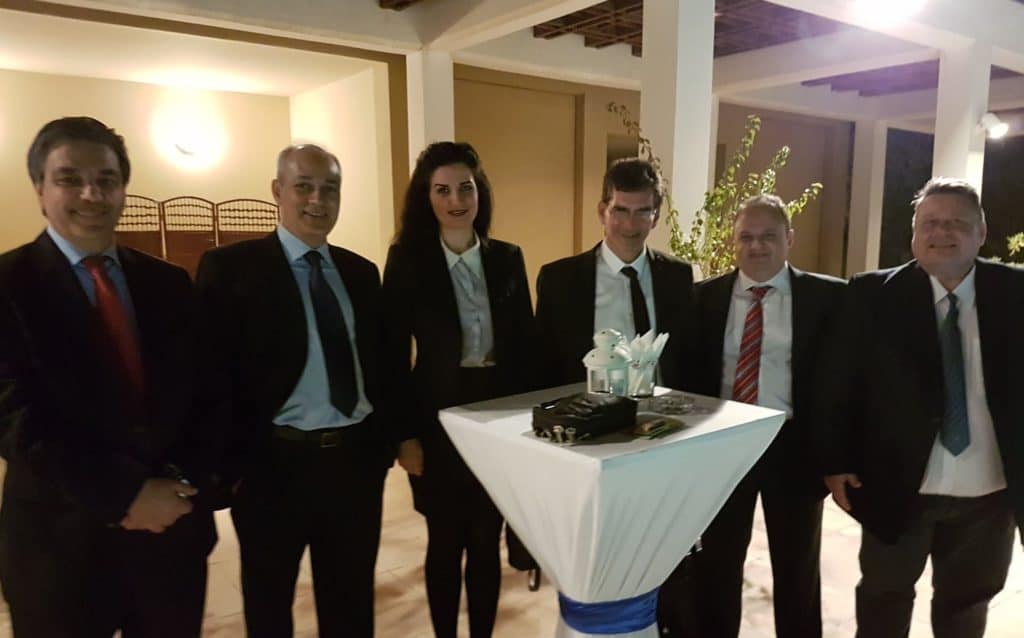
A Business visa prohibits individuals to work. Rather, it is used by individuals coming to the kingdom for short term business meetings, consultants, trainers, for business negotiations and technical support services.
Whilst the issue of work visas is greatly increasing in 2020 and beyond for employment in fields of eCommerce and entertainment, the Business visa is great for short stays of 30 or 90 days and it is renewable.
The number of business visas issued each year is unknown.
For Islamic Pilgrimage
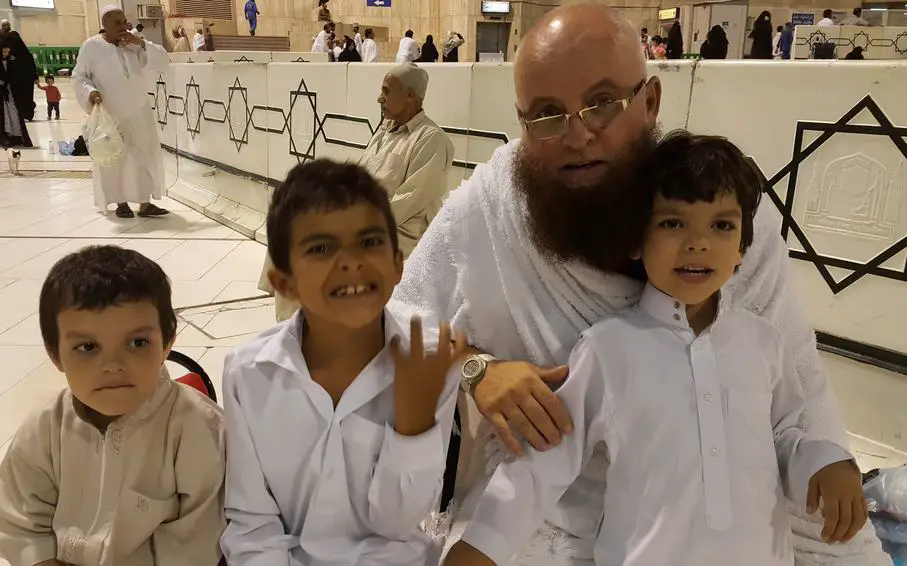
A Hajj visa or Umrah visa allows visitors to undertake a religious pilgrimage to the cities of Mecca and Madinah. The visas are for 30 days and for Hajj can be used during the Hajj season (i.e.July 28th – 2 August 2020) and ten days earlier each subsequent year.
For Umrah, the visa can be used at any time of the year outside the Hajj season.
Each year, 2.5 million Hajj and 6.5 million Umrah visas are issued worldwide. Check out the latest figures on the official Hajj government website.
For Family Visits
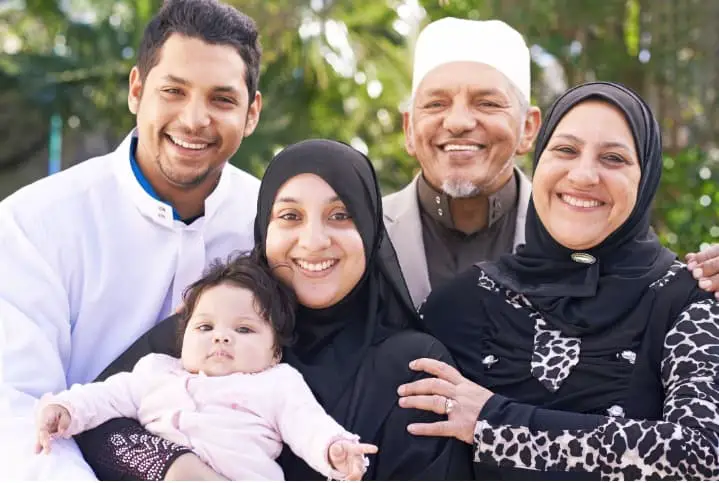
A Family Visit Visa allows close family members to stay with their loved ones normally resident in the kingdom and they can stay for 30 days (single entry) or 90 days (multiple entries). It includes parents, children, parents-in-law.
The visiting family members are not allowed to use this visa to visit Mecca to perform Umrah and the city of Madinah but are rarely challenged at the police checkpoints that exist at the entrances of these two cities.
The annual number of Family Visit visa holders is unknown. However, click here to read the Complete Guide To The Saudi Family Visit Visa.
For Tourism
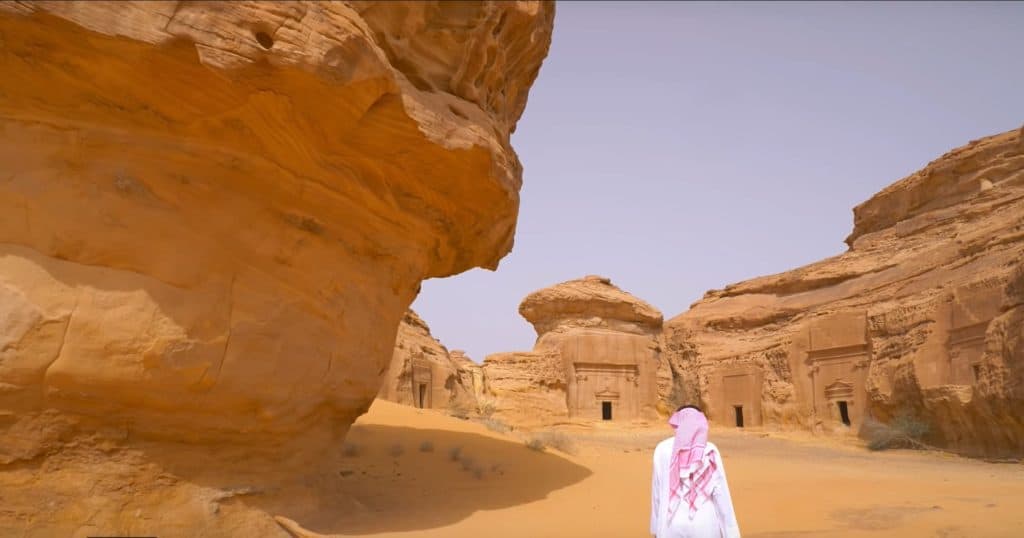
A Saudi eVisa for tourists currently allows nationals of 49 countries (and counting) including US, UK, and Schengen visa holders to apply online for an instant tourist visa or for a Visa on Arrival at a Saudi airport. There are 1 month and 3 months of visa options available.
350,000 tourist eVisas were issued in the last quarter of 2019. The number will rise significantly in the coming years.
Currently, up to 15 million Muslims visit Saudi Arabia for religious tourism. Since September 2019, thousands of Saudi eVisas have been issued and the number is increasing dramatically.
The goal of the Saudi Ministry of Tourism and Heritage (SCTH) is to attract up to 100 million additional tourists using the new Saudi eVisa by the year 2030.
To know more click here to read an article about The One-Stop Guide To The Saudi eVisa for Tourists.
For Diplomatic Reasons
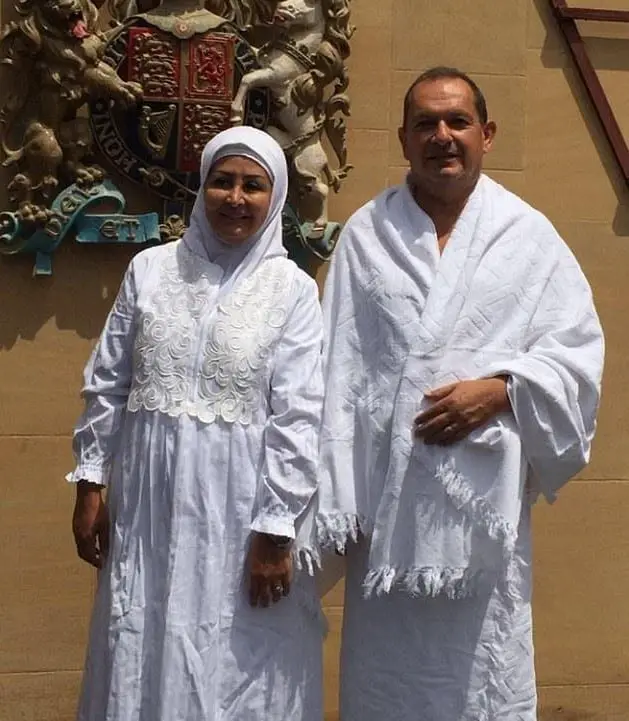
A Diplomatic Visa allows certain international government employees or members of foreign official organizations such as British Council personnel to get safe passage and immunity to prosecution under Saudi law. However, diplomatic visas can be nulled. Visas last for 30 or 90 days. For Transit Visas
You can apply for a Transit Visa for KSA if you have a connecting flight that leaves after 12 hours or more following your arrival in the kingdom. It is valid for 3 days.
For example, it is used by overland travelers driving between the Arabian Gulf countries since they have to drive through Saudi Arabia’s Eastern province before reaching their exit ports.
Total Number of Foreigners in Saudi Arabia
At any one time the total number of foreigners living or visiting Saudi Arabia is approximately:
| Category | Number |
| Residents | 10,736,293 |
| Pilgrimage | 500,000 |
| Tourists | 350,000 |
| Other | 100,000 |
| Total | 11,686,293 |
Note: In the future, the total number of expat residents will fall drastically due to the Saudization and Nitiqat Program. Click to read more in the article about Saudization and Nitaqat Program in Saudi Arabia.
More ex-pats are losing their jobs and due to punitive expat levies, most families of private company workers have already returned to their home countries.
To read about the mass exodus of immigrant workers and their families from Saudi Arabia click through to read The Real Costs Of The Expat Levy in Saudi Arabia.

Additionally, the total number of tourists and visitors will rise dramatically up to 100 million per year by 2030 due to the huge investment in entertainment and tourist resorts and infrastructures that have been planned.
Read more about conditions for and how to apply read the Guide To The Saudi Tourist eVisa.
Also, to read about some of the many tourist attractions Saudi Arabia has planned click on the following articles links.

- What Is The Red Sea Project in Saudi Arabia?
- The Tourist Guide To The 10 Amazing Volcanoes in Saudi Arabia.
- The Saudi Seasons- A Useful Overview
- The Guide To The Tantora Winter Festival
- What is King Salman Park?
- 15 Awesome Reasons Why You Should Visit Umluj
- What Is Qiddi All About?
How Safe Is It REALLY For Tourists And Foreign Nationals?
As much as I love Saudi Arabia, I would be an idiot to claim that the country is totally crime-free. There is crime, but the levels are very low. It is so low that day to day you do not really notice it.
The worst crimes that happen (though I never see them) are petty thieving, cheating, possessing and selling drugs, and parking and driving offenses. ( I see these all the time).
Click to see how drug selling in the kingdom has been blamed on outside terrorist groups.
Granted there have been serious terrorist attacks in the past. See Wikipedia entries for terrorist attacks and killings in Saudi Arabia. Today, however, the risks are much lower, even minimal. Recently, there were bombings and raids inside Saudi Arabia.
Knowing where they have occurred and sensible forward planning would reduce this risk even more.
Unlike in the US and the UK, you really will not see crimes when you come to visit the kingdom, let alone be involved in one yourself.
Tourists Are Generally Very Safe
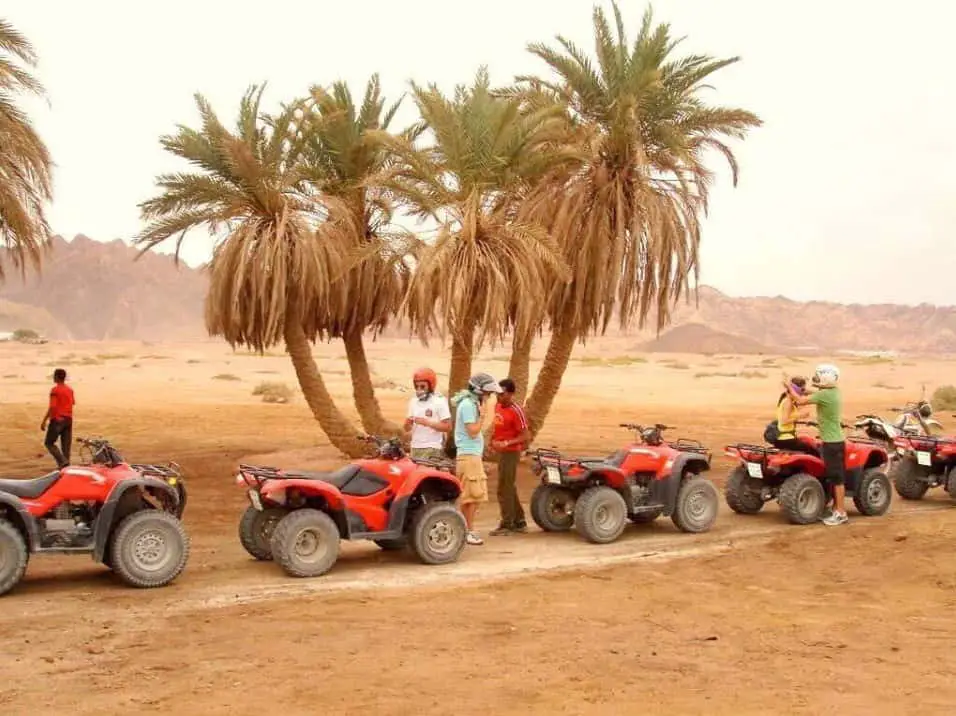
There are no personal attacks. There is very little street vandalism, almost no wall spray painting, nor destruction of public property in the kingdom.
Saudi people, expats, and the kids are very well behaved in comparison with the thugs I have encountered in the US, the UK and in Europe.
I have never seen women suffering from eve-teasing nor sexual harassment. There is no wolf-whistling, sexual harassment, molestation or rapes.
At times, I have seen some shouting matches and occasional physical altercations between individuals. These, however, are rare.
At prayer times, street market sellers can leave their stuff outside unprotected and it does not get stolen. Many times, people have forgotten their personal items in public places and later returned to find them still there. This is still very commonplace.
Tourists Can Walk The Streets In Complete Safety
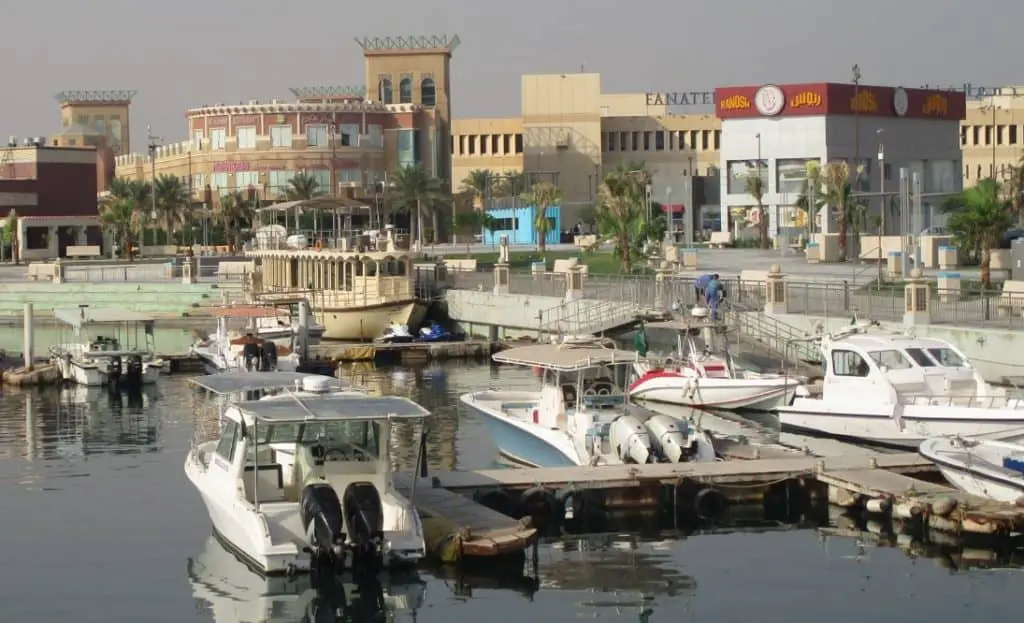
People can walk the street freely in Saudi Arabia. It is very safe. Men and women do not get attacked for no reason. Families can be together unmolested.
Children can play together outside without supervision. Many householders report how they can keep their doors open at night without the fear of getting robbed.
Women and small children can walk around at night and not experience any problems. This is true for most towns and cities in the kingdom but especially true in more rural locations.
Though they still lack certain freedoms, women actually are shown great respect and preferential treatment, say for example in banks and shops. They can jump the line and many supermarkets have WOMEN ONLY cash registers.
Since alcohol is prohibited, there are no bars, nightclubs, late-night partying, no drunk people, no drink driving and none of the horrendous problems normally related to these issues.
Boyfriend/girlfriend relationships are clearly prohibited by law together with homosexuality. So you will never see open displays of sexuality and casual sexual relationships. All intimate relations are conducted in marriage and in private.
Tourists Are Protected By Strict Saudi Rule Of Law.
The reason for the virtually non- existent low crime is the rule of law. Saudi Arabia operates under Sharia, Islamic law and crimes against your person are treated very seriously indeed. The punishments are strict and they are applied vigorously. Even potential thieves and robbers would think carefully before launching an attack on some suspecting tourists.
Types of Punishable Crimes
Drug trafficking, acts of terrorism, and murder are capital crimes. The state also punishes drinking alcohol, eating pork, open displays of non-Islamic religious symbols, homosexuality, sex outside marriage, men and women kissing and hugging in public, offensive imagery/prints, public nudity, cross-dressing, and infidelity.
Statistics
The kingdom is virtually crime-free and is proud of that fact. In the table below, compare crime rates in Saudi Arabia with the USA. After reading it decide which you think is the safer country to visit.
| Crimes | Rate per 100,000 people | Rate per 100,000 people |
| Saudi Arabia | USA | |
| Burglaries | 0.1 | 714.4 (700 times more) |
| Crime Levels | 23.41 | 55.85 (Double) |
| Drug Use (Cannabis) | 0.3% | 13.7% (46 times more) |
| Drug Use (Opiates) | 0.01% | 0.57% (57 times more) |
| Murder Rate | 0.9 | 5 (5 times more) |
| Robberies | 2.9 | 146.4 (50 times more) |
| Total Crimes per 1000 | 3.88 | 88.8 (11 times more) |
The above figures are derived from statistics obtained from Nation Master country information. Click to see more details and annual updates.
They clearly show the difference between the perception of Saudi Arabia as a dangerous country for tourists and the reality that it really is very safe indeed.
To know more general interesting facts and aspects of Saudi culture click and read the article 10 Things I Wish I Had Known About Before Going to Saudi Arabia.
Best Advice On How To Stay Safe For Tourists And Visitors
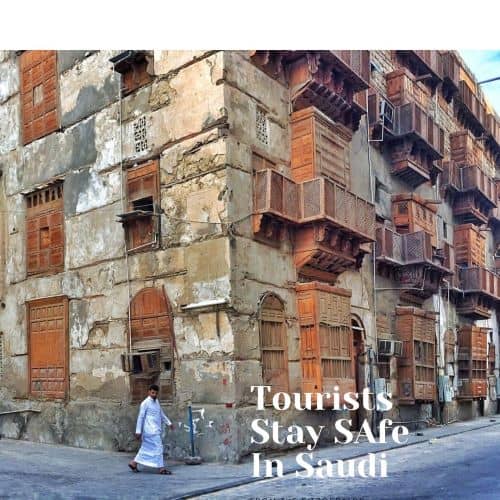

The month of September 2019 marked a huge change of attitude towards foreigners in Saudi Arabia with the introduction of the new Saudi Tourist eVisa.
For the first time in decades, it became possible for anyone from 49 + countries to obtain an instant online eVisa in about 15 minutes or even a Visa on Arrival to visit Saudi Arabia for up to 3 months.
To facilitate this, the once strict laws regarding dress and behavior have now relaxed. For example, women no longer need to put on the long black abaya garment in public as was the case in the past.
Also, unmarried non-Muslim couples are now permitted to stay together in hotels and tourist residences.
Ironically though, new laws were passed and implemented in Jan 2020 that penalize violations of public indecency that apply to citizens, residents, and tourists to the kingdom. They are laws that relate to dress for men, behavior in public and taking photos and videos. Penalties can reach up to SR 3,000 or $800.
See the government penalties list below for more details

Committee for the Promotion of Virtue and the Prevention of Vice (CPVPV)
The infamous volunteer members of the CPVPV, Hai’a or religious police no longer patrol the Malls, shopping areas and the streets of the kingdom. This group had been busy from 1976 until 2016 supervising markets and acting as the guardians of public morality.
Operating with the official police, they arrested and interrogated people whose behavior appeared to violate Saudi Islamic norms and values.
For more than forty years they were the enforcers of strict government rules regarding:
- How women dress
- The separation of the sexes
- Closing of shops, restaurants in prayer times
- Forcing Muslims into the mosques for the 5 daily prayers
- Stopping Birthday parties and Valentine’s Day celebrations
- Banning photography in public
- Banning Pokemon and Barbie Dolls
- Banning the sale of dogs and cats
- Prosecuting fortune tellers, faith healers, and magicians
For many years, I saw the CPVPV or the religious police in action. At prayer times, shopkeepers and the general public were very nervous to get customers out of stores and to lock the doors.
If groups of women sat alone in Mall cafeterias or parks, they would be questioned and moved. Women were often scolded for so-called inappropriate dress.
Violators could be detained, fined, imprisoned even executed depending on the offense. Groups of young men would be questioned and scolded for any inappropriate behavior.
Religious Police Outlawed
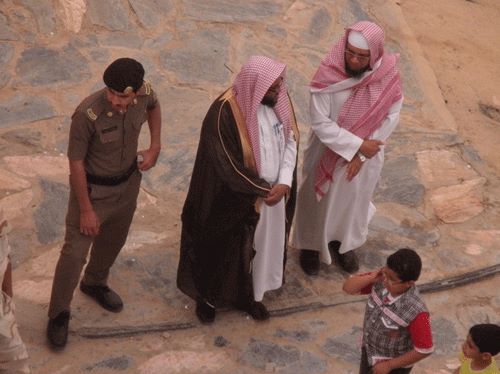
In 2016, their policing activities were sharply curtailed by the Saudi Council of Ministers following years of abuses of citizens and cases of accidental and unnecessary deaths.
Although the CPVPV is still functioning today, their activities and powers are severely curtailed. They can no longer stop, talk to, take IDs, arrest and interrogate people randomly in public places like before.
However, they can report instances of crime or immoral behavior to the appropriate authorities and if they speak to others, it must be done with kindness, respect, and gentleness. They are NO LONGER allowed to question people roughly nor to conduct interrogations.
Back in 2016, I was concerned that in the absence of the Hai’a religious police that people would start to misbehave in public and more social problems would occur.
Actually, the opposite has happened. Today, shops still do close for the 5 prayer times, but in a relaxed and respectful fashion. Many more women can be seen out and about in public, but they behave as respectfully as before.
People still pray in the mosques as before. They still respect the Saudi/Islamic customs and traditions very well, but it is done without the fear and worry of being called into question for it. Overall, it is a definite improvement.
I know there were some isolated cases of sexual harassment caused by young men, but when it was reported the authorities dealt with those very appropriately.
Results Of The Outlaw
Back in 2016, I was concerned that in the absence of the Hai’a volunteer police that people would start to misbehave in public and more social problems would occur.
Actually, I noticed that the opposite has happened. Today, shops still do close for the 5 prayer times, but in a relaxed and respectful fashion. Many more women can be seen out and about in public, but they behave as respectfully as before.
People still pray in the mosques as before. They still respect the Saudi/Islamic customs and traditions very well, but it is done without the fear and worry of being called into question for it. Overall, it is a definite improvement.
I know there have been some isolated cases of sexual harassment, but when it was reported, the authorities dealt with those very appropriately.
No More Religious Police But Traditional Attitudes Remain
The religious police are no longer in operation in public areas, but their absence has not greatly altered the behavior of Saudi people and foreign expats.
People still dress and behave as conservatively as before. The exceptions perhaps are young teenagers and the youth. They are more relaxed, louder and behave more freely and wildly than ever.
For example, you can often see young men driving cars, playing loud music and shouting out of the windows. That is something I never saw before. I noticed that young women are more relaxed in public places now.
There is still a separation of the sexes in shops and restaurants, but there is greater ease and accommodation now.
Important Tips And Recommendations For Tourists
The Have To Do’s for Tourists In Saudi Arabia
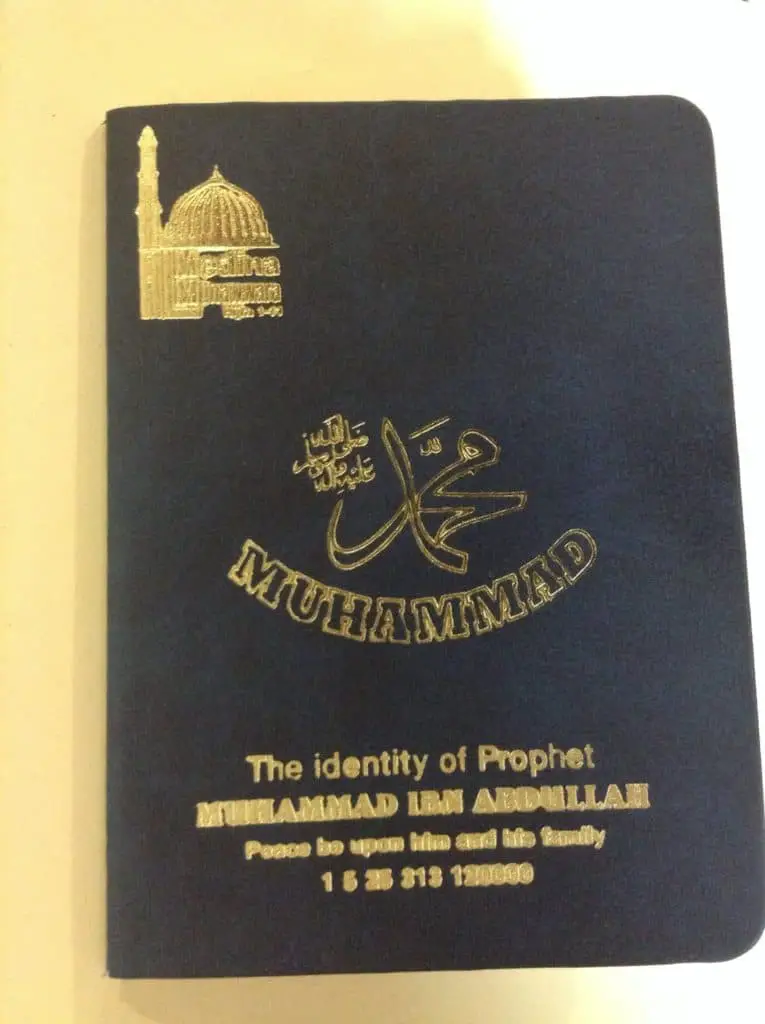
You Have To Carry Passport/ID Cards
In Saudi Arabia, people generally carry one of two forms of identity; the Residency ID Iqama or a Passport. From time to time, the police will stop you and ask to see it, especially at police checkpoints located at the entrance of most towns and cities.
You will also need it to book hotel rooms, buy phone cards, hire a car and to conduct many other kinds of transactions.
I know a number of people who make colored, laminated copies of their passport/ID documents that closely match the originals which they keep locked up in a safe location.
That though may not be a practical option if you are traveling.
In the event that you lose your passport, find out who you need to contact for a replacement.
You Have To Keep A Copy of eVisa/Visit Visa
When you get your Saudi eVisa, print off a couple of copies and keep it with you. The airport passport control (Jawazaat) will want to see a copy of it including the Saudi police and any other authorities if you get stopped whilst inside the country.
You Have To Have A Hotel Address or Residential Address
Before you fly to Saudi Arabia, write down the name and address of the hotel or place you are intending to stay in Saudi Arabia. The airport authorities will want to see it.
They will use it to check that you are a genuine tourist or someone using it just to visit family or make a religious pilgrimage (Umrah).
A tourist is more likely to be staying in a hotel, so give a hotel address initially even if later you intend to visit family or friends.
You Have To Have A Valid Credit Card
I know for a fact that many people were denied boarding on flights to Saudi Arabia because they did not possess a credit card. Make sure you have at least one that is in YOUR NAME only.
You will need to pay for your Visa on Arrival (if required) and the Saudi airlines will not believe that you are a genuine tourist or one that has access to money to spend unless you have one.
You Have To Carry Saudi Riyals
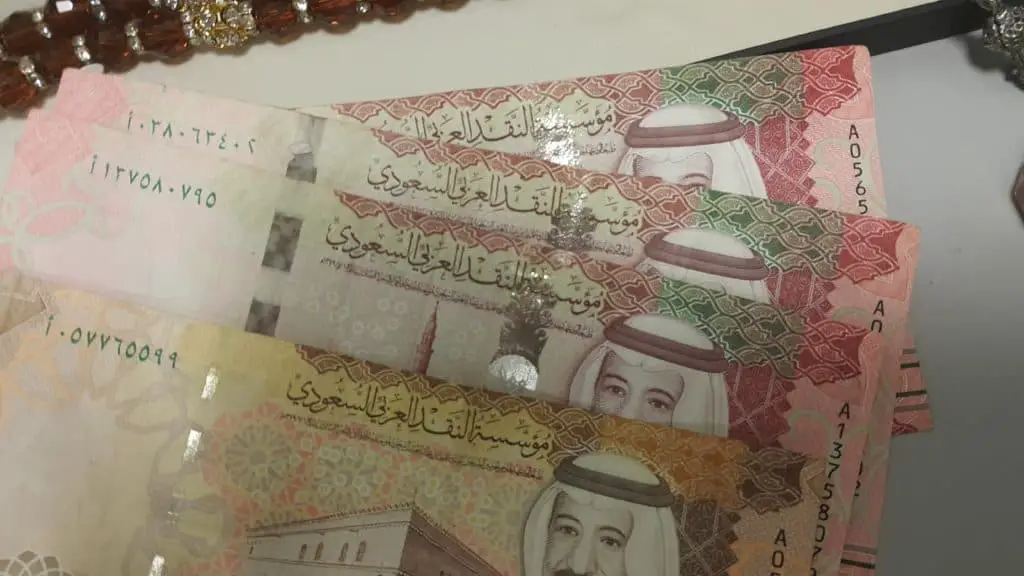
The most common way to pay for goods and services in the kingdom is a debit card and cash. Also, today electronic payment methods are gaining popularity.
However, barring a few, most supermarkets and shops are set up with card payment readers.
Unlike in the past, today they are fast and efficient. They rarely malfunction and are very convenient.
However, you will still need cash for payment in small restaurants, grocery shops (Bakalas) especially if you are traveling in remote areas. Since it is pegged to the US dollar, some shops will take either SRs or $US’s as currencies.
In the Saudi Eastern region, shops are also happy to accept larger notes of the Kuwait and Bahrain Dinar, the UAE Dirham.
Don’t try paying in Qatar Riyals not at least until relations between the two countries have healed.
You Have To Buy Health Insurance
Health Insurance is required and is a requisite to obtaining the visa. Health Insurance is required for a Single and Multiple Entry Saudi eVisas.
The cost of the visa insurance depends on age, sex and medical background of the applicant. Currently, the prices are around 140 SR.
Buy your insurance from an authorized insurance company online. Remember, your insurance is for travel purposes only!
The travel insurance will only cover treatment for emergency scenarios. You can use it also in the case of traffic accidents, repatriation after death, dental, dialysis, problems of pregnancy and injuries through accidents, etc.
However, the costs of childbirth and associated expenses must be met by the Saudi eVisa holder.
To read about Saudi insurance for travelers click on the following article The Complete Guide To The NEW Saudi Family Visit Visa which contains ample information on insurance, how to get and what it covers.
You Have To Have Your Home Country Driving Licence
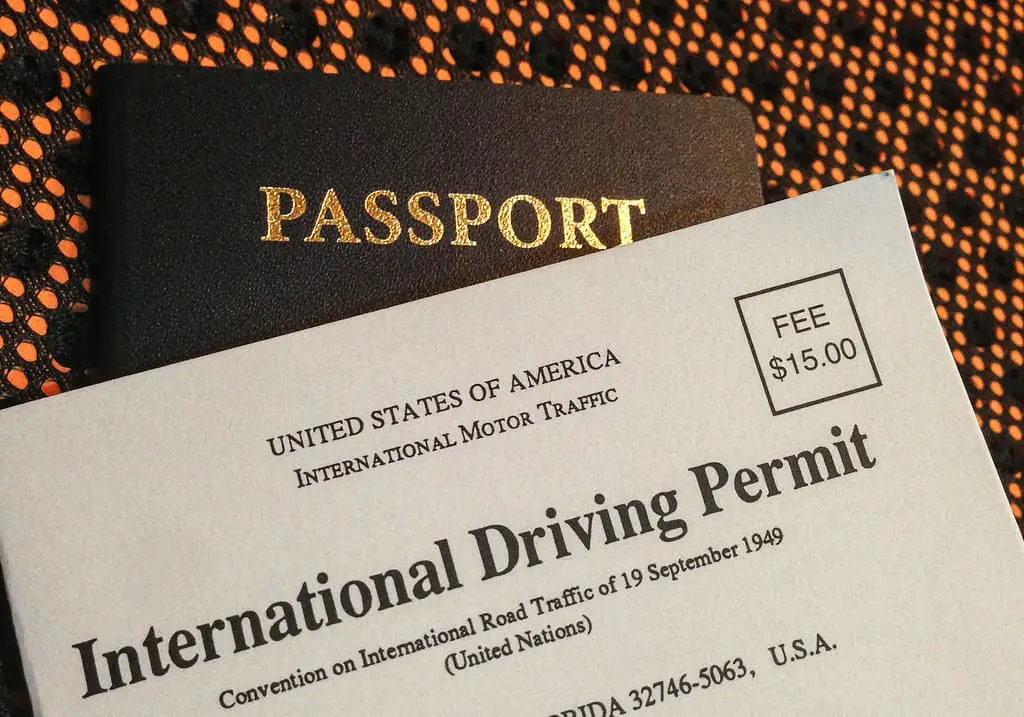
Since the Saudi eVisa began to be issued in September 2019, tourists can use their home country driving license or International Driving Permits to rent cars.
Make sure you take it with you when you leave home and that it is valid for at least three more months.
At police checkpoints located at the entrance to most Saudi towns and cities, in addition to your passport, you will be expected to produce a valid driving license together with your car hire insurance.
You Have To Know The Emergency Numbers and Next of Kin Details
Keep a list of Saudi emergency contact numbers, details of your next of kin (abroad) and note any special medical conditions that might affect choices of medical treatments in cases of accidents and/or your hospitalization.
Call Najam Insurance Evaluators (below) in the event of a car accident. They will come to the accident scene, photograph, assign culpability and produce a report of the accident for the insurance companies.
| Emergency Services Numbers For Saudi Arabia | |
| Emergencies | 112 |
| Ambulance Service | 997 |
| Fire Service | 998 |
| Police | 999 |
| Traffic Accidents (Emergencies) | 993 |
| Najm (Car Accident Evaluators) | 9200 00560 |
You Have To Know Who The Police Are
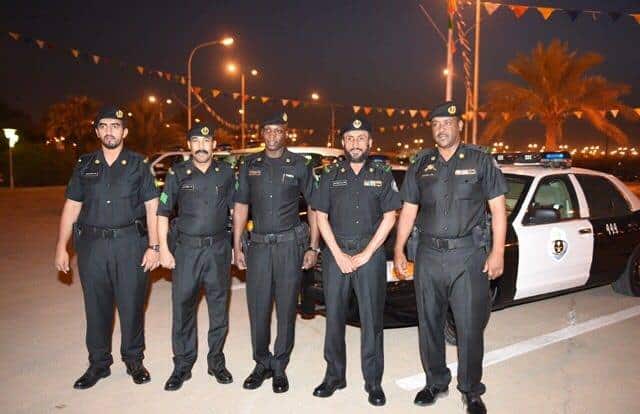
There are a number of police or security forces in operation.
- Traffic Police (Black Uniforms, Berets and Patrol Cars in 2016)
- Plain Clothed Police (Thobe, Headgear Shamagh and Black GMC Suburban
- National Guard (Black Uniform and HeadGear Shamagh)
- Local Security Forces (Brown Uniforms and Green/Red patrol vehicles)
- Religious Police (Defunct) (Thogbe, Headgear Shamagh and Cloak, Bisht)
- Haram Mosque Police (Red and Orange Uniforms)
You Have To Wear a Hat, Carry and Drink Lots of Water
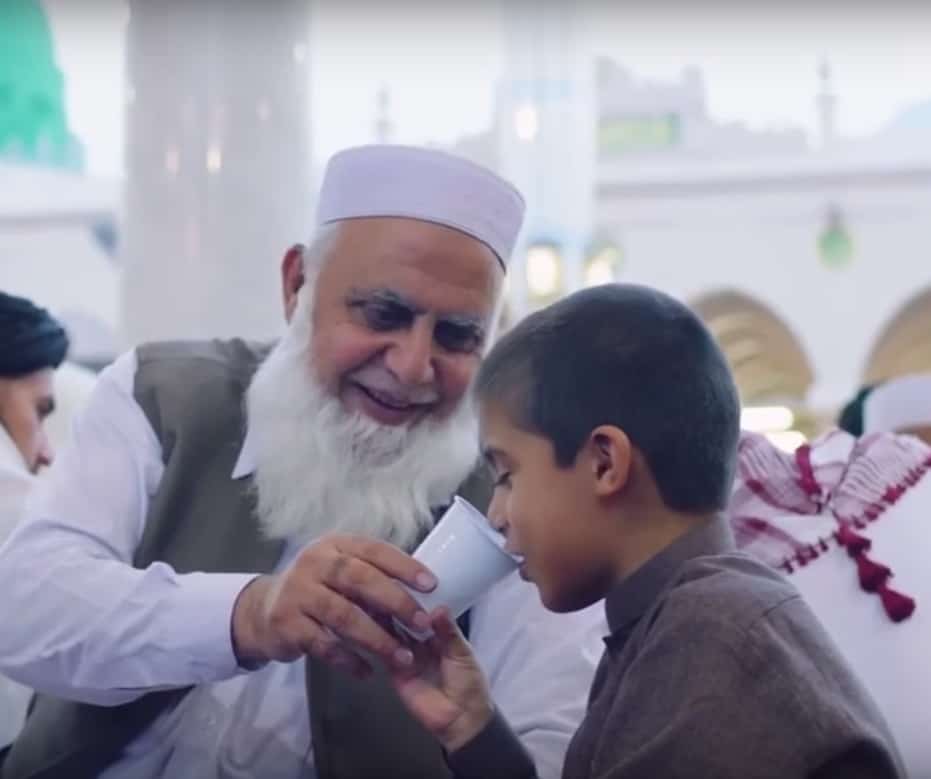
If you must come to Saudi Arabia in summer prepare yourself for intense heat 40-50°C. The heat is like opening a hot oven.
Step out of the air-conditioned environment onto the street and the intense heat strikes you hard. The difference is that in Saudi out on the streets you cannot close the door to stop it.
Very quickly you will begin to get hot, then sweat profusely. If you stay directly under the sun for long, your face will start to burn and turn red.
For obvious reasons, you should also take plenty of cool, bottled water with you and drink from it constantly to replace the water you will lose in sweating throughout the day. This is especially important when you get stuck in traffic jams.
Make sure you have an insulated bottle with you in the car to keep the water cool. The car interior can often get hotter than the outside air.
You Have To Know The Best Months To Visit
The ideal time to visit Saudi Arabia is between January and June. In these months the weather is cooler and you will feel more comfortable.
Even if you are coming to a resort for a beach holiday, the temperatures combined with the humidity make it impossible to sit on the beach in the summer even in the early morning or late evenings.
There is usually only about a few inches of rainfall every year. This occurs between January and May. There are tumultuous thunderstorms in December-January and light sprinkling showers in the spring months.
In the Red Sea area there is a lot of year-round sunshine, minimum rainfall and the dry heat is moderated by the Red Sea. Temperatures fall at night and the evenings are generally cool.
You Have To Use Sunscreen and Wear A Hat
If you must go out into the midday sun, take a white parasol with you or wear a wide-brimmed hat, with light, loose clothing and screen your face with sunblock protection cream.
You Have To Have Petroleum Jelly Handy

If you intend to walk around, beforehand buy a pot of vaseline petroleum jelly or skin-soothing cream for heat rub especially for the interior parts of the body that meet clothing, for example between the upper thighs and around the groin area.
Buy products that contain zinc for the cream to work best.
There is nothing more painful than walking about the place with a thigh rash. It is excruciating. I know it is from personal experience. Ouch!
You Have To Use 220 V US/UK Adaptors
Two types of power outlets are in use in Saudi Arabia; US and UK.
The most common socket is the 220 US type. Adaptors are usually sold with the UK styled socket since many new products today come with the UK style lead and plug. The black adaptors cost SR 10-15 in Saudi retail.
You Have To Make Extra Copies Of Passport Photos
I always make it a habit of having extra copies of passport photos of myself and each member of my family. In the past, authorities, agencies, and retailers would ask for it together with my name and details for registration.
Today, however, they simply photocopy my Residency Permit (Iqama) or take a camera photo. I always keep a few handy just in case.
You Have To Wear Light, Cotton Underwear/Clothes
Wide, loose-fitting billowy clothes work best in Saudi Arabia. Tight-fitting underwear can cause you to overheat, rub and cause a skin rash.
Always separate the parts of your body that touch and rub as you walk about, for example, the top of the thighs. I usually apply lots of zinc cream regularly throughout the day to prevent heat rashes.
Cotton clothes work best, though very light chiffon or nylon will also suffice. Lighter colors attract less heat but they also get dirtier quickly.
You Have To Wear Robust Sandals
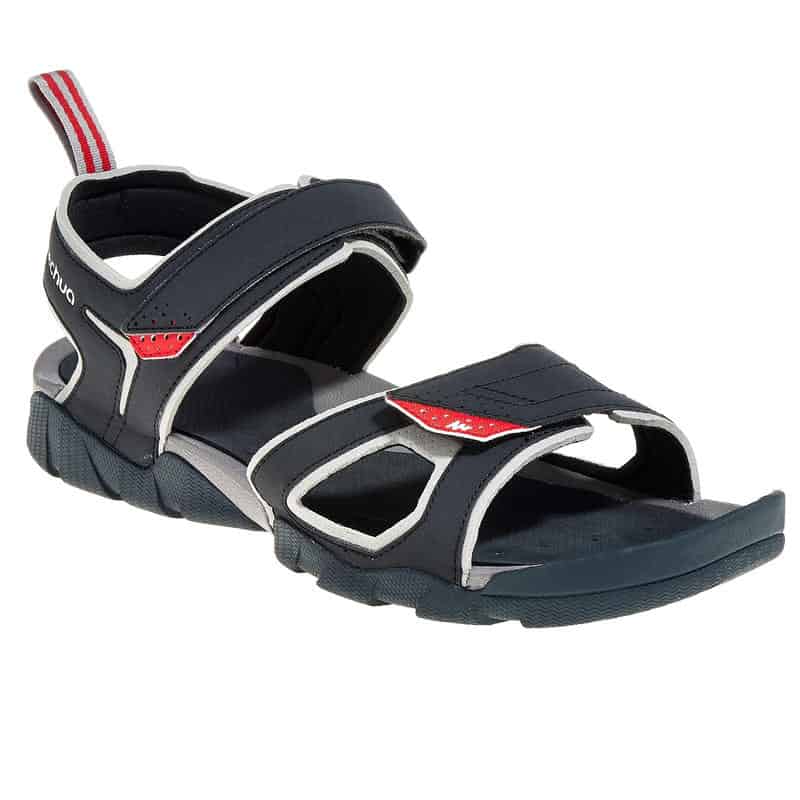
You can wear trainers/sneakers in the winter and strapped sandals in the summer work best.
Open sandals are fine for walking short distances, but if you are a tourist who is on the move, sandals with straps that secure around the ankle are essential.
You Have To Learn To Deal With Saudis
Saudi people are either very shy or openly hospitable. In general, men are friendly to men and women to women. They are courteous, sociable and chatty.
I have written an article entitled What Are Saudi Men Really Like-Real Travel Advice It goes into the depth of the characters including the do’s and don’ts for tourists in Saudi Arabia regarding meeting Saudi people.
You Have To Learn to Haggle
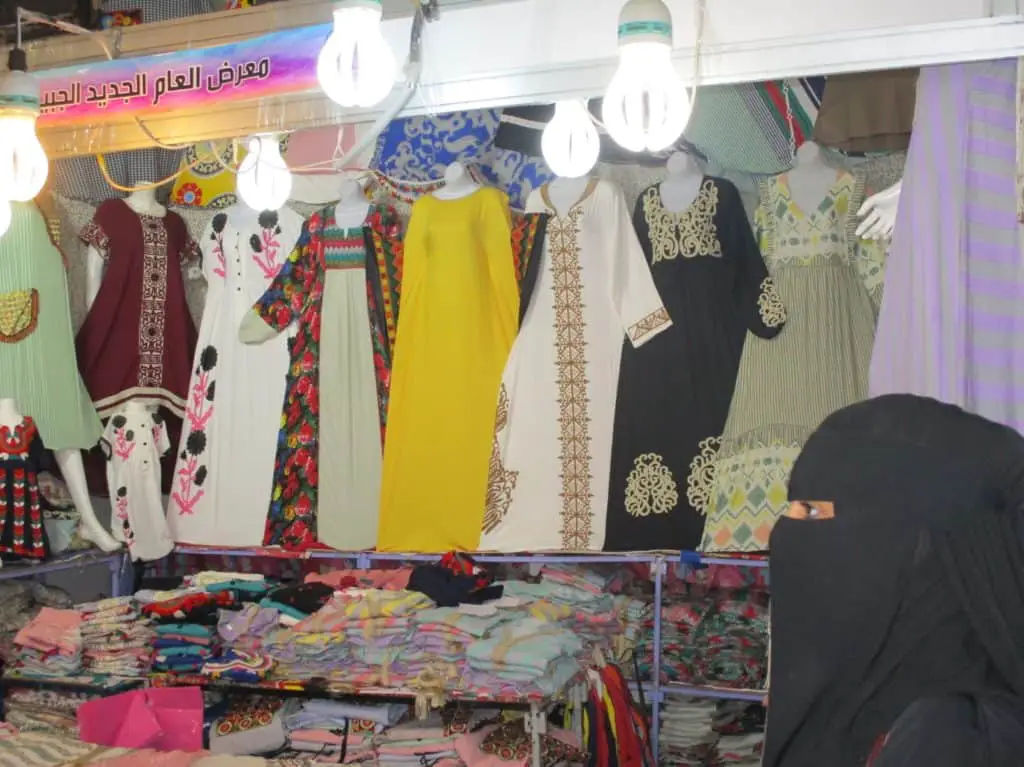
When I first came to the Middle East, I felt too shy to haggle in shops and the marketplace. However, I got used to it because shopkeepers expect it. They deliberately raise their ticket prices expecting you will bargain.
In larger shops and supermarkets there are fixed prices. So, you just pay them. However, you can still haggle in many of the smaller retail stores, especially on high priced items.
For example, you can haggle in an Indian run store selling luggage. On the price tag, it will say SR250. It is possible to haggle the price down to 200 SR or even less.
Today, because of the mass exodus of expats out of Saudi Arabia, shops desperately need customers and to move stock. Also, there are frequent sales and discounted offers. I usually buy during the sale times and do friendly haggling.
The Should Do’s For Tourists In Saudi Arabia
Do Delete Pornography, Political, Gun-related or Offensive Materials Off Devices
It is a punishable offense to bring pornography, politically suspect, gun-related and other offensive materials in Saudi Arabia, to store it on external hard drives, your phone and on any other media.
Delete it all before you arrive in Saudi Arabia. All porn and politically suspect websites are censored within Saudi Arabia unless you resort to using a VPN. Even free VPN services, harvest user information for marketing purposes.
Today, I never use free VPN, since I notice items I had searched for using free VPNs appearing frequently in adverts on my social media sites especially on Facebook.
Do Dress And Behave Conservatively
For Women
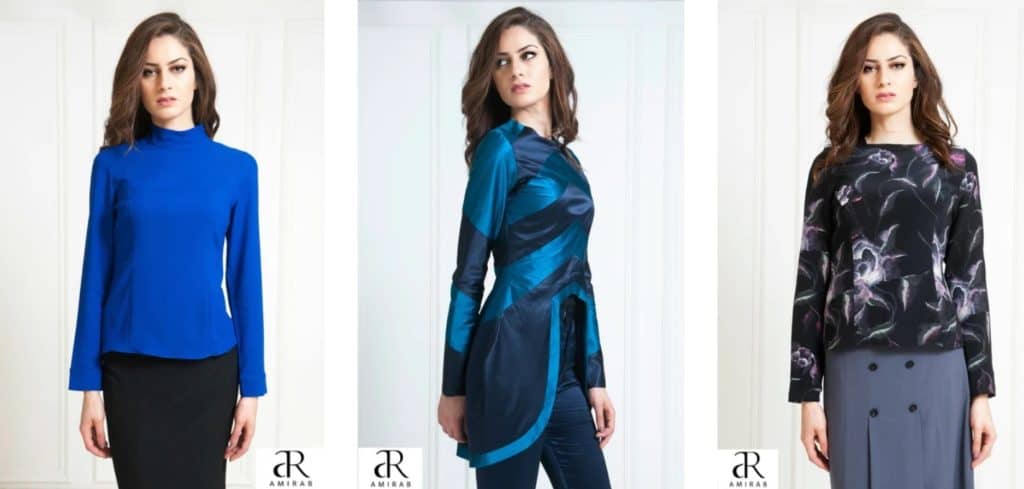
 Clothing For Women. Modest With A Classic Twist!
Clothing For Women. Modest With A Classic Twist!Dress laws for female tourists/visitors changed in 2019. They no longer need to wear the long black Abaya that was obligatory nor to cover their heads using a scarf (Hijab).
Even so, I strongly advise women to dress casually, but conservatively. This means that you should wear clothes that cover your entire body from your neck down to your ankles. See Awrah for women.
They should not be clothes that hug or hold tightly onto the body revealing your physical shape. Let them be loose and flowing.
Under no circumstance should you show cleavage, camel toes, protruding nipples, bare arms or top part of the chest. Doing this will attract a lot of undue attention and you will get stopped by the police, fined, possibly arrested, even deported.
For Men
There is also a new dress code for men and male tourists coming to Saudi Arabia. Essentially, they can wear any type of clothing provided that it reveals nothing of the genitals and the area between the belly button down extending to below the knees.
This means that men should also dress casually, but conservatively. Men should wear short-sleeved shirts/tee shirts and long pants. (No sleeveless shirts) In the same way, the clothes should not hug the body to reveal the size and shape of your genital area.
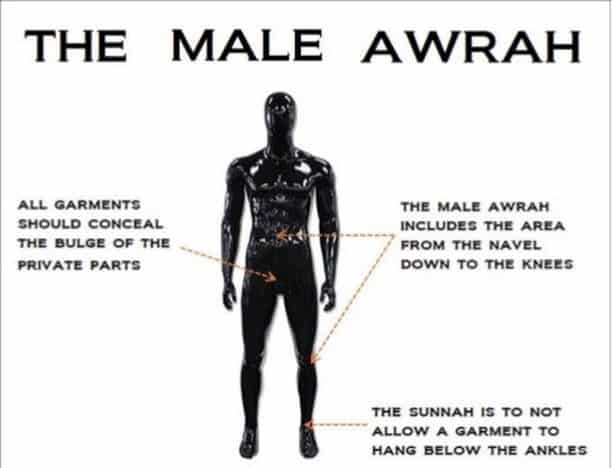
The trousers can be short but the length of the legs should extend to below the knees. This is to cover the Awrah, the area of the body which is not to be seen in public.
I have dealt in detail with what men should wear when coming to Saudi Arabia in a very useful article entitled The Common Sense Guide To How Non-Saudi Men Should Dress In Saudi Arabia.
Unmarried Couples Do Be Discreet
Today, tourist couples who are unmarried can book into hotels and walk about freely without molestation. It is no longer criminal to do so. When booking into a hotel provided that you show your tourist visa and passports, the reception will admit you both into the same hotel room.
No one is allowed to question or raise the issue that you are unmarried. However, just because it is legal does not make it right in the minds of many people.
My advice is to be discreet about the fact you are not legally married and as you go about your day, act and speak as if you are. No one should be any the wiser and they will remain unaffected.
Do Learn Defensive Driving
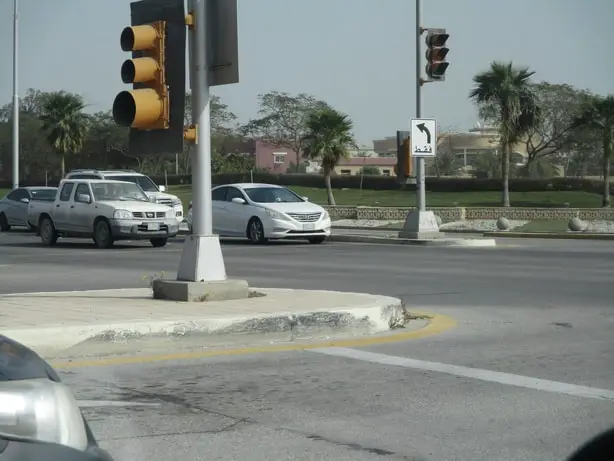
The standard of driving in Saudi Arabia is abysmal. In spite of this, it has gotten better over the past few years due to traffic cameras and expensive fines for violations.
Remember, people, drive on the right-hand side of the road. Speeding is the greatest problem and also that drivers take too many risks. You will see them on the highway tailgating.
This means that drivers go at high speed close up to the bumper of the car in front, in an attempt to force the driver to move aside into the next lane.
Also, young drivers will overtake on the wrong side of the road and zig zag at high speed and in a dangerous fashion across the lanes weaving between cars and other vehicles.
Another problem which has lessened today is Drifting. Young people will deliberately drive in the wrong direction down a road and suddenly do wheel spins at high speed.
In the past, the police tolerated this type of behavior and it resulted in many deaths and injuries. Today, official drifting zones exist outside the city boundaries for young men to continue with this dangerous and mindless ‘sport’.
Do Cover Your Head In The Sun
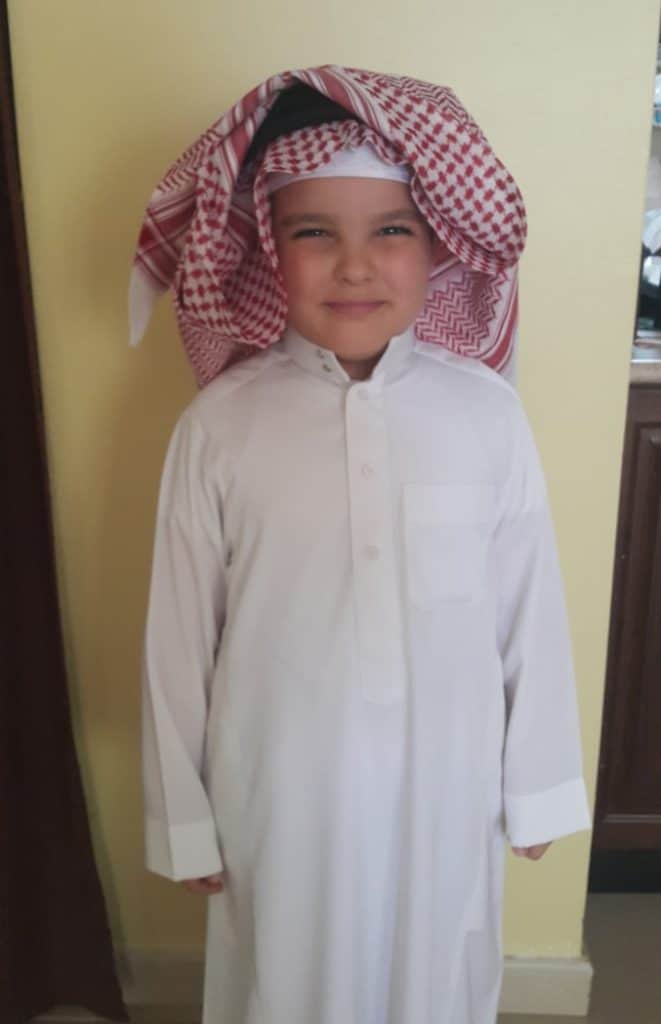
They say that Mad Dogs and English Men go out into the Midday Sun. Please do not go out into the midday sun unless you are wearing a hat. You will quickly become overheated and get heat stroke/exhaustion.
Wear a peaked cap to keep the sun off your face, high factor skin cream and sunglasses if you can bear to wear them.
Do Respect The Prayer Times
Supermarkets, shops, restaurants and businesses all close for about 30 minutes to observe the 5 daily prayers.
They are approximately timetabled to occur at:
- 5 am -Al-Fajr
- 12 pm -Ad Duhur
- 3 pm – Al-Asr
- 6 pm- Al-Maghrib
- 8pm- Al Isha
If you are shopping or eating in the restaurants, you can usually remain inside to continue shopping or eating, but there is no service. They will turn the lights down low, stop serving you and lock up the cash registers.
After 30 minutes, everything springs back into action as the lights turn back on and workers resume their duties once again.
It is best to plan your supermarket trips and restaurant meals giving yourself plenty of time before and after you arrive at the locations.
Do Learn Arab Saudi Customs/Traditions/Language
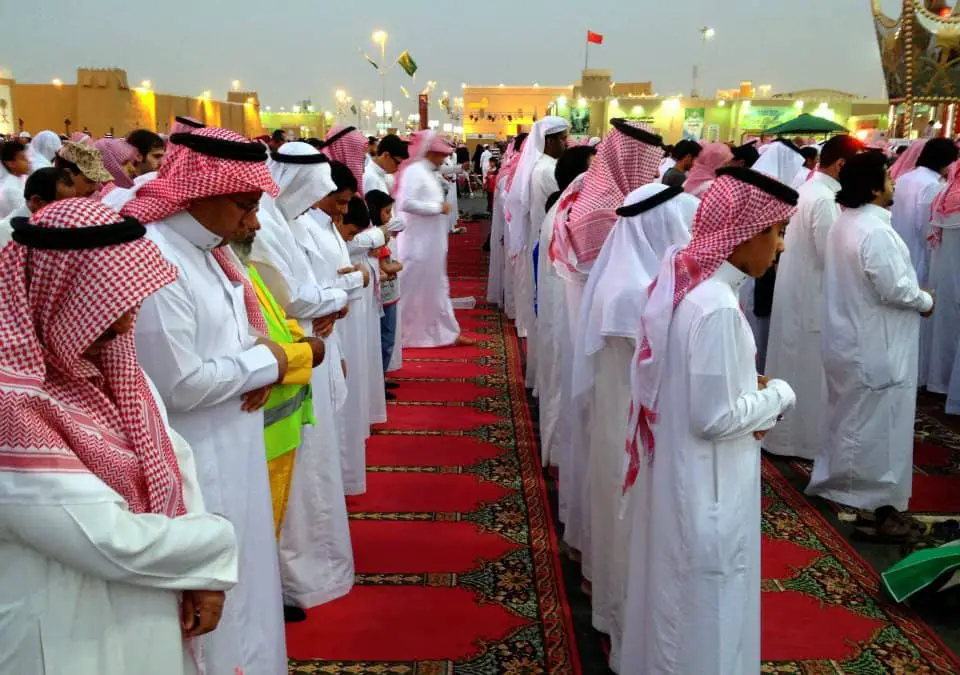
Knowing and observing Arab/Saudi customs can greatly help you to win friends and influence people during your stay in the kingdom.
Learn some of the greetings protocols, the etiquettes of hospitality and best social practices.
I have dealt with these in some detail in my useful article, What are Saudi Men really like-Real Travel Advice. It will show you exactly how to behave and give you advice about all the things you should and should not be doing when you are in Saudi Arabia.
Do Take Your Time
When they first arrive, many westerners often feel a strong sense of impatience and indignation when officials and systems do not work as they expect and as they are used to in their home countries.
The US and the UK are highly service orientated and efficient. That is not the case in Saudi Arabia, though over the last few years, it has changed with the electronification of public systems.
Saudi life is modern, but comparatively, it is slower. People work more slowly and systems are steeped in bureaucracy.
Learn to take your time. The wheels turn slowly and you should not complain, rant and rail at officials who are only there to help you. Your papers and business will be dealt with as soon as possible. In the meantime, relax, enjoy and let the bureaucratic wheels turn at their own speed.
Do Be Patient With Officials

Officials everywhere in the kingdom are slow, but they are very courteous and helpful. The best way to get anything done with people in offices and bureaucratic situations is to first establish friendly relations. Ask how the official is, be chatty and friendly. Stay on his good side. If he offers you tea and coffee, sit down, accept and remain at ease and welcoming.
If you behave in this way, Saudi people can be very accommodating and helpful and will likely try to speed up the process of issuing your documents or necessary paperwork. If you behave badly and impudently, they will guarantee you the exact opposite.
Do Smile And Be Courteous
Unlike in Western countries, people in Saudi Arabia are not automatons. The focus at work is not necessarily to be efficient and highly productive, rather it is to be functional and obliging.
That means that in the course of getting what you need from people, you do it in a way that is courteous and respectful.
Saudi people hate to lose face in front of others. Be polite and show verbal and nonverbal signs of appreciation. It’s the fastest way to get things done in what is after all still a traditionally slow-moving world.
Adopt Try To Adopt Local Customs
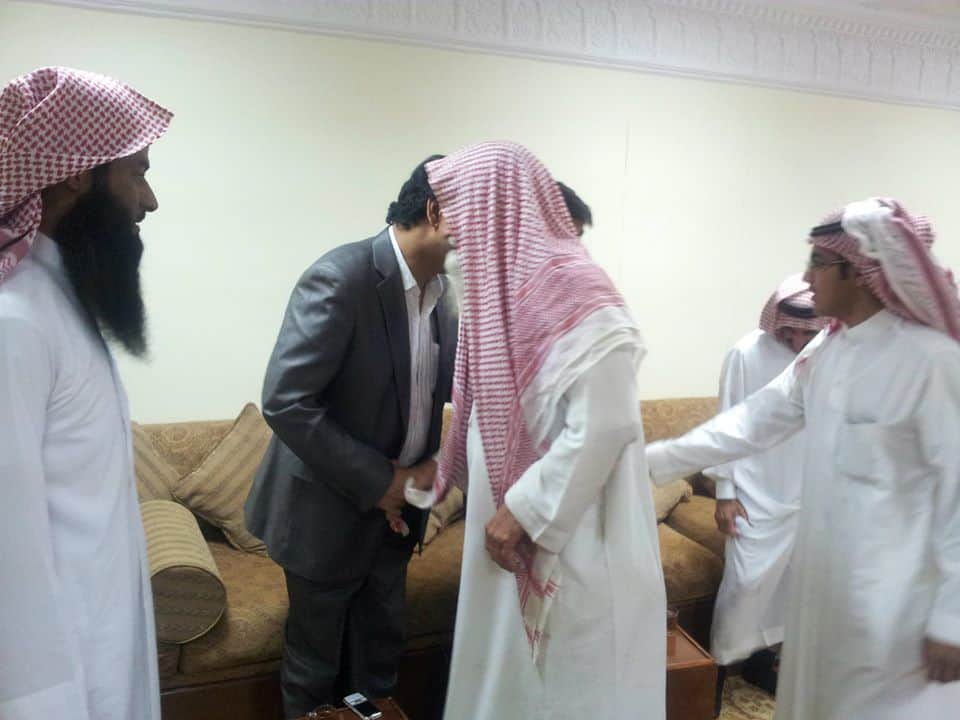
I have traveled to many countries and my motto has always been, ‘When in Rome, Do As The Romans Do’. This means I try to dress, act and speak the same as the people in the new environment I find myself in. I also modify my behavior and expectations. This approach has reaped huge benefits.
For example, in Saudi Arabia, I wear a thobe and headgear, in Morocco, a Jalabiya and in the West, slacks, t-shirts, and trainers.
I quickly try to learn the language of the country where I find I am a guest, to say the words and phrases that please people and get me accepted there as quickly as possible.
I also make a commitment to follow the rules and regulations of that country and am very mindful of social expectations. After all, I am a guest in the country as if I were a guest in someone else’s house.
By adopting and behaving according to local customs, I have quickly integrated into the new societies and stand out less like a sore thumb.
It is also safer because you are less likely to get targeted by thieves and people who wish to harm you if they assume you are accustomed to the ways of the country.
In Morocco, this has helped me many times, where petty thieving is rife.
This is especially true in more traditional, remote and isolated regions of Saudi Arabia.
Do Watch Out For Petty Thieves
As in any country in the world, tourists become targets of cheaters, scammers and petty thieves. Compared to many countries, Saudi Arabia is very safe and petty thieving is not very common. However, it does exist, especially in situations where the thieves are absolutely certain they will get away with the crime.
The advice for Saudi Arabia when it comes to personal property, such as your wallet, smartphone, and bags is to be vigilant and prudent as you would anywhere. The chances of you getting pickpocketed and robbed is slim, but you should still keep your wits about you.
Do Know The Traveller Scams
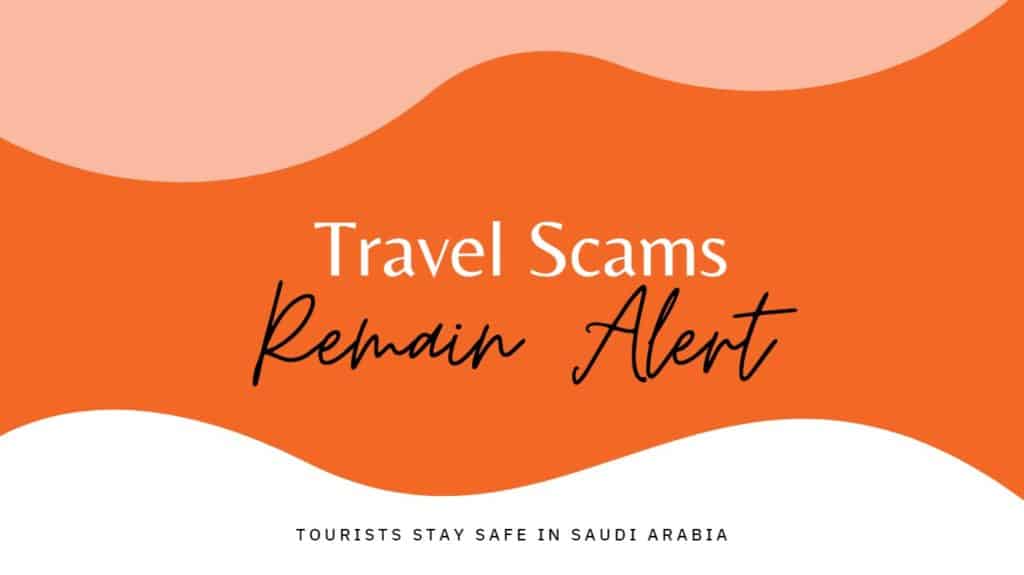
The scams in Saudi Arabia are not as sophisticated as those you will find online. In crowded areas, certain people will approach you with hard-luck stories and you can give them a little bit of money.
However, I never heard of anyone being approached and purposely being a victim of a complex scam.
There are instances of taxi drivers overcharging customers ignorant of the prices. If I want to take a taxi or pay for personal service, I usually ask a few local people first how much you would be expected to pay.
If the price I am being charged falls within the range that the locals have told me is the going rate, then I usually am happy to pay it.
Do Stop At Traffic Lights & Observe The Speed Limits

Most traffic lights in towns, cities and main roads are being monitored by a sophisticated system of cameras individually operated by an army of human beings operators. It is called ‘Sahr’.
It was the case in the past that drivers would routinely cut the red traffic lights at high speed causing an untold number of accidents, deaths, and injuries. All that has stopped now.
If you jump a red traffic light, you will pay an SR 3,000 fine. If you exceed the speed limit, you will pay SR 300. If you do not wear a seatbelt today, you will get a similar fine.
Driving conditions on the road are still bad, but they have improved greatly in the last three years. On quiet roads,
I always used to cut the red traffic lights until one day I received a SR 3,000 fine in the first week of implementation of the new ‘Sahr’ road monitoring system. Never again!
Notices of any fines will be texted to your mobile phone almost immediately they are issued.
The Should NOT Do’s For Tourists In Saudi Arabia
You Should NOT Bring, Buy, Sell, Drink Alcohol

Most people know that Saudi Arabia is a dry country. Drinking alcohol is not available anywhere for sale except on certain expat compounds where authorities do not interfere.
If you are a binge drinker and want to cut down, then coming to Saudi Arabia for a spell is a good idea.
Do not attempt to bring, to buy, sell or drink alcoholic drinks unless you are looking for serious problems. Most binge drinkers that I know, travel across the causeway from Al Khobar to Al Bahrain where they can freely drink to their heart’s content.
You can buy non-alcoholic beers in the supermarket and other malt type soft drinks. Read the stories and see below the penalties for being caught drinking alcohol.
You Should NOT Bring Nor Eat Pork Products

It is prohibited for Muslims to eat pork or products that contain it. It is not available for sale in supermarkets and delis. Leave your pork meat supply at home in the freezer and do not attempt to bring it into Saudi Arabia.
You Should NOT Smoke, Buy, Sell Or Carry Illegal Drugs
There are organized groups who try to smuggle drugs into Saudi Arabia. From time to time, individuals get caught and get severely punished.
You would be very unwise to try to bring a supply of illegal drugs with you to Saudi Arabia or to try to buy drugs from street vendors in the kingdom. It is likely to be an ambush and such a move can land you in serious trouble.
Some men both Saudi and Asian chew and spit tobacco. You can see who does that from their yellow teeth. Also, in Yemen, there is a plant with chewable leaves that induce ease and relaxation called Qat. Though logistically, it is easily available in Saudi Arabia, it is considered illegal and prohibited Haram to use.
I know that some people do take drugs. There is a special hospital in Dammam specifically designed to treat individuals with drug addictions.
However, unlike in Europe, in all my years I have never been offered rugs for my own consumption, Qat, Marijuana or any other intoxicating substances.
You Should NOT Shake Hands With The Opposite Sexes
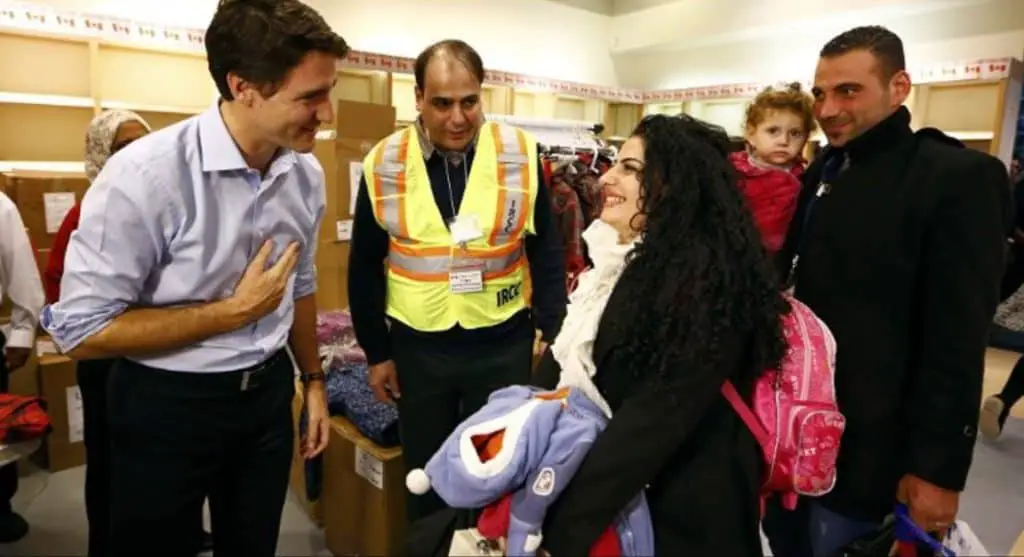
Socially, men and women do not mix in Saudi Arabia. Separation of the sexes begins at home, where non-family males and female house guests sit in separate living rooms.
Also, all Saudi national schools are single-sex, except for international schools. In restaurants, there are special seating areas for women and families. My sons also attend all-boys schools which suits us very well.
Saudi Men and women never shake hands and do not socialize, except very superficially in shops or supermarkets.
In other Arab countries like Egypt and Morocco handshaking with women is acceptable. In Saudi Arabia, it is not.
Even expat and visitors do not shake hands with members of the opposite sex. At first, I thought this was very strange until I became accustomed to it.
You Should NOT Flirt With Women/Men
In Saudi Arabia, marriages are arranged and boys meeting girls is a very formal procedure set up by the family. There are no girlfriend/boyfriend relations except those held in secret.
I know that secret love relations exist, but they often end in tears when one of the lovers is rejected as a potential marriage partner.
I know girls and boys look and these days particularly I see instances where groups of teenagers walkabout in flirty, joky fashion.
However, the majority of young people would feel ashamed and feel they have let down their families if they were to enter into illicit love relations.
You Should NOT Kiss, Hug or Embrace Women/Men In Public
If you come to Saudi Arabia as a married couple and it is best you should, do not hug, kiss or embrace your partner in public. Walking and respectfully holding hands is fine but full embraces and passionate kisses will outrage people and you will get reported and will be arrested.
Please be sensitive and wise in these matters. You cannot openly express your affection in public in quite the same way as you can back home.
You Should NOT Seek Prostitution
Many years ago, I was once offered a hook-up with an Indian prostitute. I was very surprised and of course, refused.
It may have been a trap, but it became clear to me then such services were available in Saudi Arabia. I doubt it is well known or widespread.
There are more profitable ways to spend your money such as on the many wonderful tourist attractions and natural wonders that the kingdom offers. See the links above.
Your focus should be to gain new cultural experiences, not those that are easily available in the country from which you came.
You Should NOT Dress Like A Woman/Man
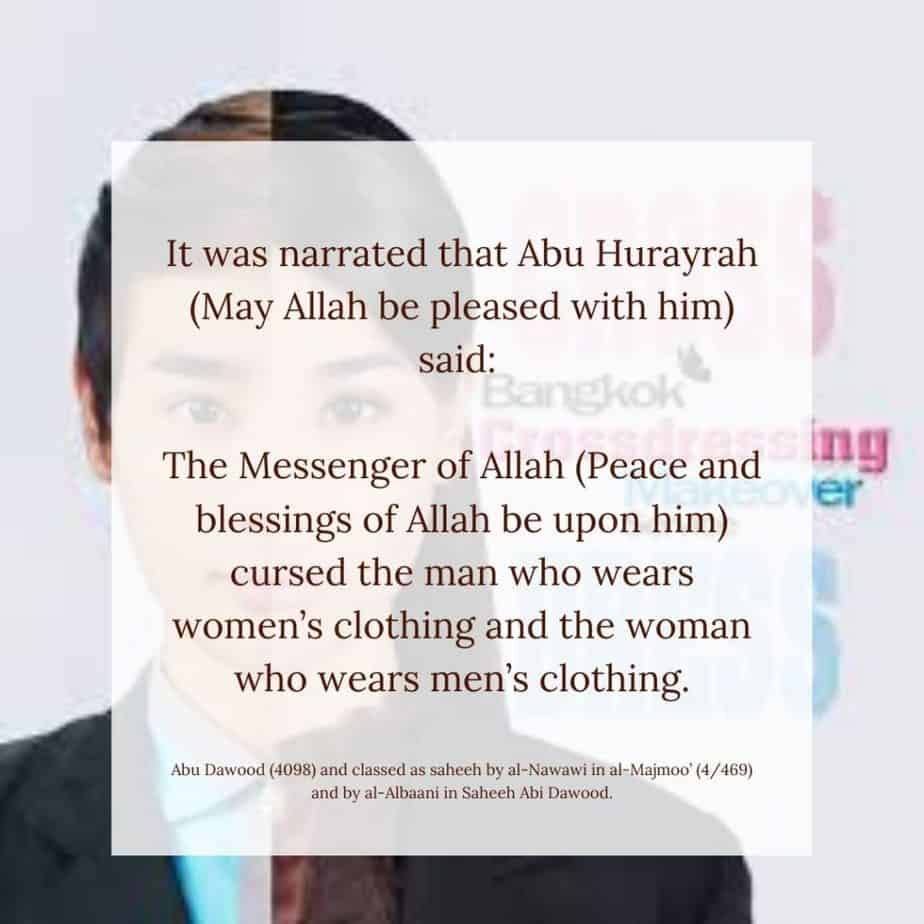
Crossdressing is completely prohibited in Saudi Arabia. Women should wear clothes intended for females and men should dress in clothes intended for males to wear.
Men should also avoid wearing gold rings, chains, and any type of bracelet.
They are prohibited items for Muslim men to wear. Insisting on wearing them while you are in the kingdom will repulse people and your relationship with others will become strained. They are not punishable offenses.
Rather, men wearing jewelry is socially very unacceptable.
Click to read the article Are Muslim Men Allowed To Wear Women’s Clothes and Jewelry? for more information.
You Should NOT Openly Display Homosexual Behaviour
In Saudi Arabia, men are very affectionate to other men, even to the point where they will walk hand in hand down the road.
This is not understood as a homosexual act rather an expression of close friendship.
Possibly there are gay love relationships occurring, but it is something that is likely to occur in secret. Never admit that you are involved in a love relationship with someone of the same sex. It will put you into hot water.
Read the article that fully explains the character of Saudi men and guides you through the do’s and the don’ts in socializing with them in What are Saudi Men really like?
You Should NOT Practice Magic, Mediumship Or Fortune Telling
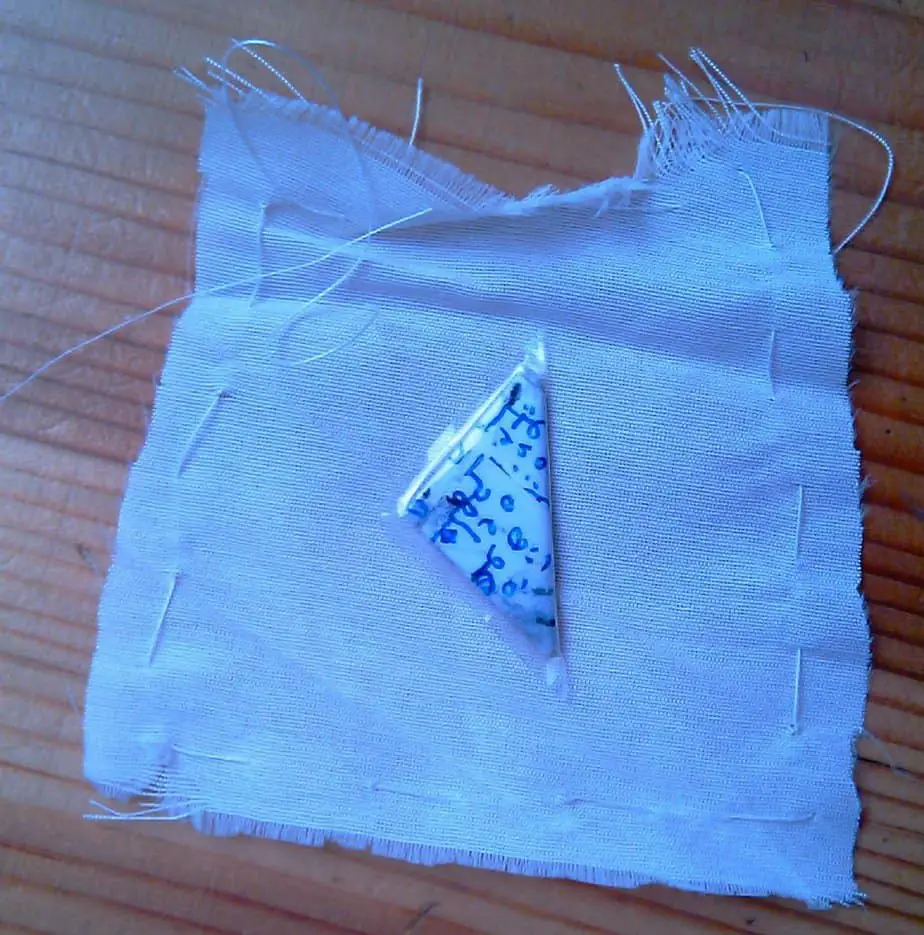
Making magic, mediumship and fortune-telling are serious matters and punishable under the Islamic Sharia law.
A number of times, I have read about African magicians who have been intercepted at airports with magic making paraphernalia. They are arrested and receive severe punishments.
You Should NOT Dance Or Play Loud Music
Young Saudis sometimes play loud music out of their car windows whilst driving. Once completely prohibited, Saudi Arabia is now hosting musical concerts and events in Riyadh, Jeddah and the Tantora Winter Festival.
Attitudes are changing, but for the most part, people do not play or listen to music in public.
There is no supermarket music or atmosphere music in shops. I am not sure how long that will be the case.
Keep your music volume down even when you are listening to it through your earbuds.
You Should NOT Do Parties

For the same reason, do not do parties where alcohol, singing, and dancing are involved especially if members of the opposite sex are there or it is a gay event.
Do not attend. It is likely to get raided, closed down and you will be arrested and imprisoned.
This is something very difficult to talk your way out of.
You Should NOT Expect Free Speech
Saudi Arabia is not founded on principles of democracy or free speech. It is a Kingdom with Islam at the basis of its laws and institutions.
You can express your opinion on matters, but if they contradict absolute truths that concern Islam and matters of law and morality, you will find yourself in real trouble.
You Should NOT Criticize King, Saudi Arabia Or National Politics
When it comes to the Saudi Royal Family, politics and international matters concerning Saudi Arabia, just keep your mouth shut. That also includes the things you write and say on social media.
Frankly, what Saudi Arabia does is really none of our business. We are guests in the country, here for the purposes of tourism and to enjoy new cultural experiences.
Simply abide by the conditions set by the Saudi eVisa and follow the rules and laws governing the lives of people.
Individuals who openly condemn Saudi Arabia, the King and politics quickly upset people and are usually denied access to the kingdom or deported within a day or two back to their home countries.
You Should NOT Pray, Preach Religion Or Religious Ideas
Preaching Christianity or inviting others to join your religion, party or cult is completely prohibited and a punishable offense.
The religion of Saudi Arabia is Islam and trying to convert others away for this is a very serious matter indeed.
You Should NOT Wear Offensive Printed Pictures/Slogans On Clothes

Wearing clothes like tee shirts, hats, and jackets, etc that show offensive images or wording will get you arrested and fined SR 100 and SR200 for repeated offenses.
You Should NOT Enter Mecca or Madina -Non-Muslims
Non-Muslims are not allowed either Mecca or Medina. It is principally for crowd control and also to keep the cities as holy sanctuaries for Muslims only.
If you do manage by some fluke to enter and get caught, you will be fined, imprisoned and eventually deported.
You Should NOT Take Photos Of Government Buildings Or Officials
It is not allowed! Do not do it!
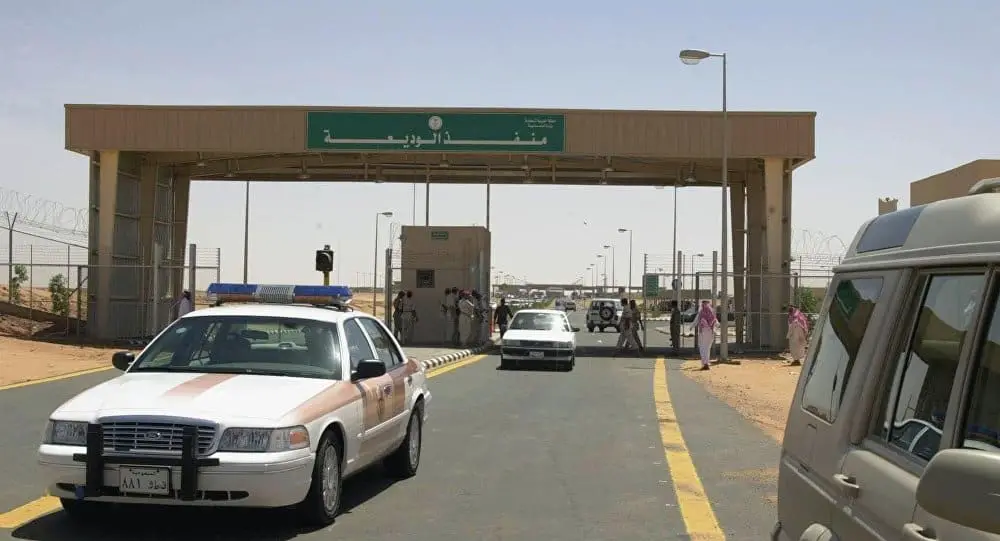
You Should NOT Take Photos Of Women Or People Without Their Permission
It is not allowed to photograph men and women without their permission. Take care where you point the camera. I have made this mistake and lived to regret it.
Also, you cannot take pictures of traffic accidents and other public scenes. Someone is going to get upset.
Before you shoot, please ask for permission. This is a serious matter. You can get arrested and fined SR 1,000 and SR 2, 000 for the second offense.
You Should NOT Enter Women’s/Men’s Sitting Areas
When you visit Saudi families, expect that men will sit only with men and women with women in separate rooms. Do not insist on sitting with your partner while you take your coffee. It goes against the grain of the culture and offends.
You Should NOT Wish People Happy Christmas, Happy Easter and Happy Birthday, etc

People in Saudi Arabia probably will not comment if you do, but for Muslims, they only celebrate two main events Eid Al Fitr and Eid Al Adhar.
These are Christian events and customs that are not acceptable for Muslims to celebrate and mean nothing to them.
You Should NOT Go To The Yemeni border Or Qatif (See Map)
Check out with your home country embassy the areas they advise you not to travel to. Currently, it is the Yemeni border in the Jizan area where a war is currently taking place and political problems in Qatif.
Also, some oil installations in the Al Hasa region were bombed recently. So, it is better to double-check before online to see what is happening and only travel to safe areas in Saudi Arabia.
You Should NOT Fly Drones Without Permission
Get permission first if you want to fly drones. It will be confiscated and you will get fined, even arrested.
You Should NOT Overstay Your Visa
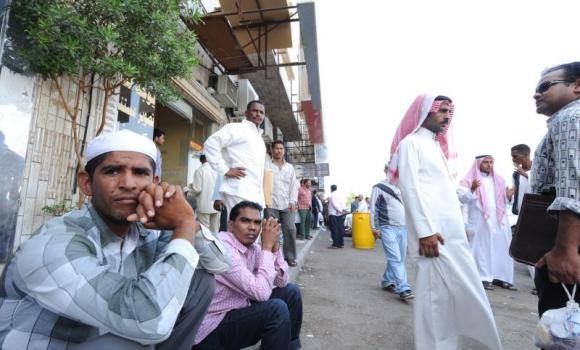
Overstaying your Saudi eVisa is a serious matter. The ministerial authorities will impose harsh penalties.
They are:
- Imprisonment in Detention Centre
- Deportation
- Pay expenses for repatriation
- Possible Ban on reentering Saudi Arabia
You Should NOT Drive Faster Than 110/120 kph On Highways

The speed limit for driving cars on highways is 120 kph. The Saudi Sahr camera system monitors traffic and driving in excess will trigger the automatic cameras and offenders are fined SR 300. Equally, cutting the red traffic lights attracts a fine of SR 3,000.
Penalties
Fines, flogging deportation, public execution. Click the Wikipedia article to read about capital punishment and links to information about the legal system in Saudi Arabia.
to read about capital punishment and links to information about the legal system in Saudi Arabia.
Related Questions
Can women travel alone? In the past, women needed a male family member with them to be able to travel. Today, women are free to travel alone inside the kingdom and not to be challenged by anyone concerning this. However, for obvious safety reasons, I recommend that you travel with family, friends or a male relative.
Is it safe to work in Saudi Arabia? Yes, there are employment safety standards and workers must have health insurance. The kind and level of safety depend on the work situation. Workers’ rights are also protected apart from domestic workers. The law in this respect is changing slowly.
